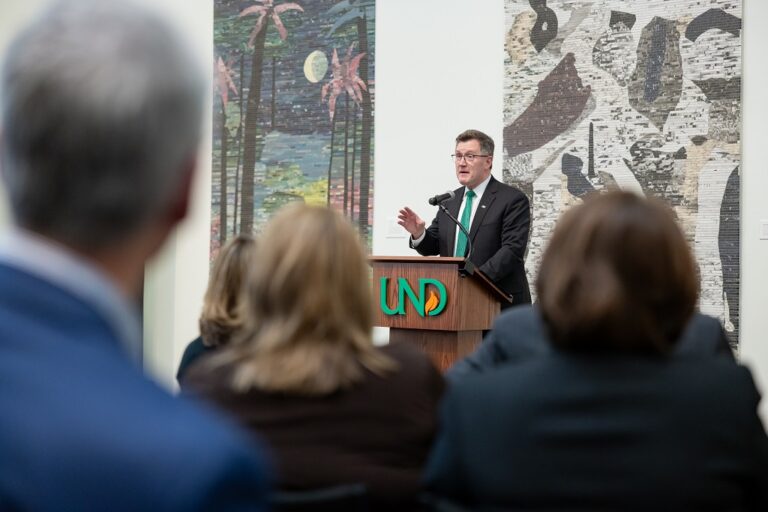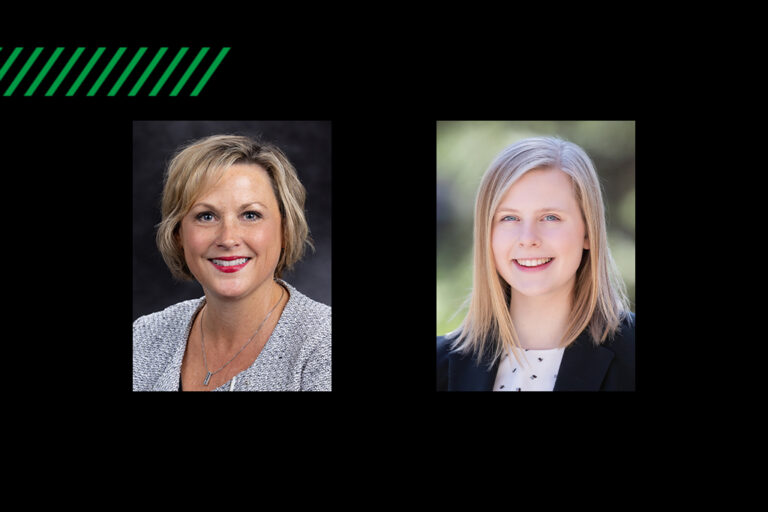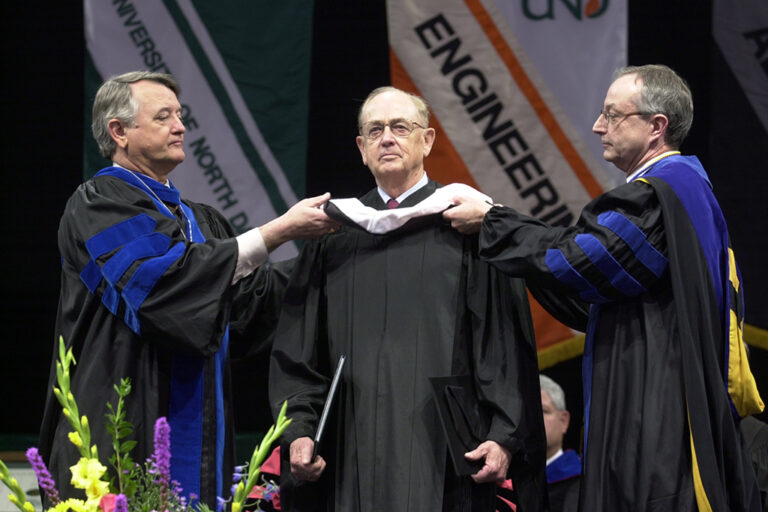President Armacost, UND leaders discuss legislative session
Wednesday’s virtual Town Hall featured questions and answers about new laws, UND LEADS and more

During a virtual Town Hall meeting on Wednesday, May 3, UND President Andrew Armacost addressed UND faculty and staff and answered questions, in particular about the 2023 North Dakota legislative session that had adjourned a few days earlier.
Though some of the legislative bills discussed during the Town Hall have yet to be signed by Gov. Doug Burgum, Armacost and fellow University leaders talked about the anticipated outcomes for UND.
“The Legislature put us in a good position,” said Armacost, characterizing the amount of financial and verbal support UND received during the 2023 session.
North Dakota’s appropriations for higher education – as written in House Bill 1003 – met many of UND’s requests and needs for state support, including for salary increases, research and upcoming campus projects.
Other bills passed may require further examination and communication both with state agencies and the campus community before their impacts are fully understood, Armacost and others said during the Town Hall.
Throughout the meeting, University leadership assured attendees that more information and clarification will be made available to the campus community as it develops. In reference to some of the higher-profile legislation, Armacost said that combatting misinformation is important for the institution.
“What we need to do is put our interpretation of the impact of these bills into a format available to all faculty and staff members as well as for people potentially looking to come to UND,” Armacost said. “We need to take some of the sensational headlines and work hard to tamp those down and give people a sense of what’s really happening with each of these bills.”
Other topics also were discussed during the Town Hall, including news of the formation of a strategic plan implementation team to be led by Ryan Zerr, professor of mathematics. Zerr will take on the title of Associate Vice President for Strategy & Implementation and oversee campus activities to help ensure the success of the UND LEADS strategic plan.
The implementation committee will be co-chaired by Zerr and Angie Carpenter, director for special student populations. It will include Amanda Moske, chief data officer; Shane Schellpfeffer, director of institutional effectiveness & accreditation; Anna Clark, director of communications & planning for Academic Affairs; and Rob Carolin, chief of staff.
The University is also in the final stages of establishing a contract with Huron Consulting, which will conduct a full review of salary and pay at UND. The process will take an estimated 17 weeks and will provide UND with actionable data about any existing pay disparities, said Peggy Varberg, associate vice president of human resources & payroll services.
For those interested in other topics covered in the Town Hall, video of the hour-long session is available online, and an AI-generated transcript also is available.
Below is a bill-by-bill account of the legislative topics discussed at Wednesday’s virtual meeting.
House Bill 1003 – Higher Education Appropriations
Of note, institutions of higher education in North Dakota will receive 15% more in total appropriations than in the previous biennium.
- Salary pool increases of 6% and 4% in Year One and Two of the new biennium, respectively
- Employees with an evaluation on file who have met all expectations for their position are eligible for the salary increase.
- Exact increases may differ from employee to employee.
- “The state generously funded the entire portion of the appropriated increase, so that we could minimize tuition increases,” said Karla Mongeon-Stewart, vice president for finance & operations.
- Positions funded by resources such as grants and contracts will have to use those revenues to cover salary increases.
- Health insurance cost increase by 15%
- “Health insurance increases are exactly the same as salary increases, so they follow the funding,” said Mongeon-Stewart.
- Tuition freeze
- General tuition rate for undergraduates is frozen at last year’s rate.
- “The Legislature has given the institutions the flexibility for programs that have differential tuition to increase by 1% each year of the biennium,” said Mongeon-Stewart.
- $20 million for Higher Education Challenge Grants, with $5 million of that total going to UND
- Challenge Grants match donated money with state money to provide for scholarships and endowed faculty positions.
- $9 million to support space-related and national security research and education, otherwise known as UND’s Science, Engineering & National Security Corridor
- $2.5 million for high-performance computing, which was part of a joint request with North Dakota State University and will support a research network infrastructure
- 5% increase for additional research and economic diversification activities
- Funding included to support Merrifield Hall renovations, as well as the development of a new STEM Complex
Section 19 of House Bill 1003
A section was added to the appropriations bill after a separate bill, intended to affect the tenure renewal process at two peer North Dakota institutions, failed in the Legislature.
Armacost noted that Section 19 says, “The president of an institution, under the control of the State Board of Higher Education, may adopt policies, procedures and directives for the institution with input, but no authoritative control, from faculty and others through shared governance.”
“I don’t see any change to our UND Constitution or any of our processes of shared governance, as a consequence of that section,” Armacost remarked. “I know the provost, the leadership team and I all feel a strong connection to the ideals represented by shared governance.”
House Bill 1040 – Public Employees’ Retirement System
“House Bill 1040, which addresses the public employees’ pension plan, is phasing out the defined benefit plan and putting into place the defined contribution plan – so going from a pension plan to a 401K-like plan for new employees,” said Armacost.
“More information will follow on how that transition will happen, but those who are currently under the pension will have the option of sustaining their pension as currently defined in your benefits.”
- Those under current NDPERS plan will be “grandfathered in” upon the cutoff date of Jan. 1, 2024, according to Varberg.
- “What we don’t know is if people will be allowed to move plans,” Varberg said.
- When asked if employer contribution rates will increase by 1% effective Jan. 1, 2024, Mongeon-Stewart said yes. What is unclear is whether additional funding was put into the budget to cover that 1% increase, or if it is up to departments to meet that, she said.
- The specifics of the existing NDPERS pension plan’s closure, as they affect UND specifically, have yet to be fully understood, said Varberg. Upcoming meetings with NDPERS in the coming month will help answer more questions.
- “It’s not that UND doesn’t know what we’re doing yet, but I don’t think the state and NDPERS were fully prepared for this bill passing. So, we’re waiting on them to get us the information you need,” said Mongeon-Stewart.
Senate Bill 2161 – Re-designation of the State Energy Research Center
UND’s Energy & Environmental Research Center has been sustained as North Dakota’s State Energy Research Center, and its funding has been increased from $5 million to $7.5 million, per biennium.
- “The sunset clause, which would have caused that entity to go away after a certain amount of time, has been removed,” said Armacost.
Senate Bill 2247 – Specified Concepts at Institutions of Higher Education
Armacost remarked that the topics listed in the bill are those that the University cannot compel people to follow or subscribe to, to be employed or pursue education at UND.
- Academic freedom and freedom of speech will be protected.
- UND’s Office of General Counsel is working with the State Attorneys General to work on guidelines and assist UND with compliance.
- When asked about impacts of the bill on UND’s ongoing DEI initiatives, Tamba-Kuii Bailey, special assistant to the president for diversity & inclusion, said some DEI training will be affected, but training related to non-discrimination requirements in compliance with state and federal law will not be affected.
- “We will continue to make sure we’re being thoughtful and continue to do the work as it relates to diversity, equity and inclusion that we need to do here, at UND,” Bailey said.
- When asked how the bill might impact staff members, and if there are any foreseeable changes of which staff should be aware, Armacost remarked that the bill is going through a review by the North Dakota University System legal office, and that a number of employees’ rights elements are included.
“We will spend some time over the next few months looking at various trainings that we have on campus, both those that are required and those that are optional, to make sure we’re complying with the law in the way we talk about these issues,” said Donna Smith, assistant vice president for equal opportunity and Title IX.
“I need to reinforce the notion that the University of North Dakota and our policies must be rooted in principles of dignity and respect, making sure that everybody has fair access to education, and that there isn’t discrimination because of one’s background,” Armacost said.
House Bill 1473 – Gender and restrooms
- The legislation is specific to residence halls on campus, according to Troy Noeldner, director of housing and residence life.
- Noeldner reported that the bill specifically affects residence hall floors where there is a designation of male or female gender. Apartment-style housing on campus will not be impacted, Noeldner said.
- UND’s legal counsel is looking closely at the legislation, but Armacost said UND is “absolutely” in compliance with what’s been specified.



